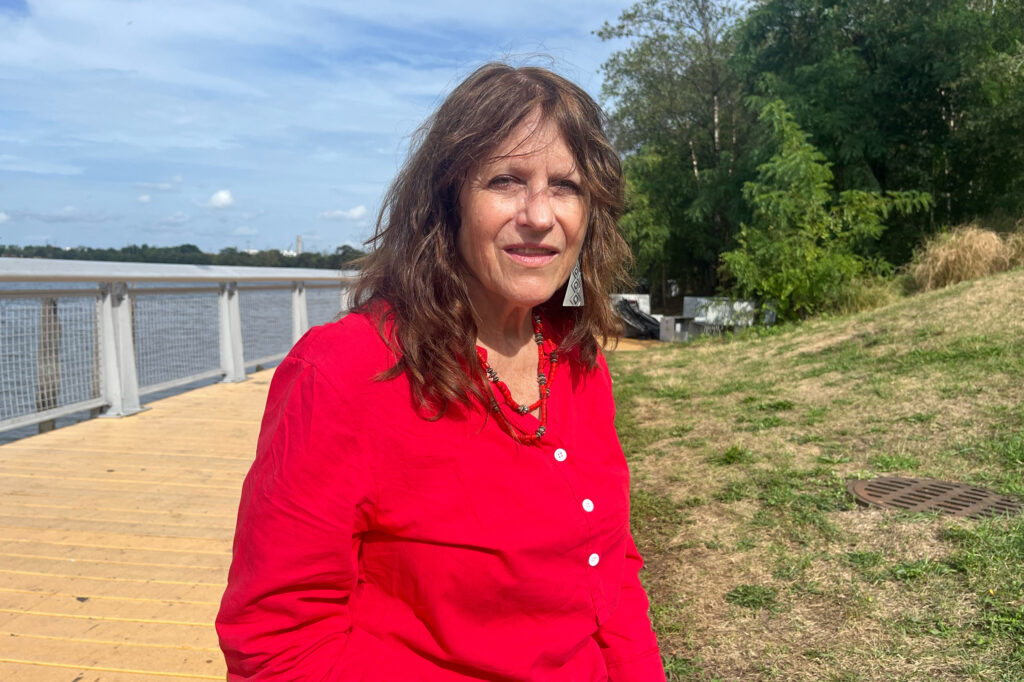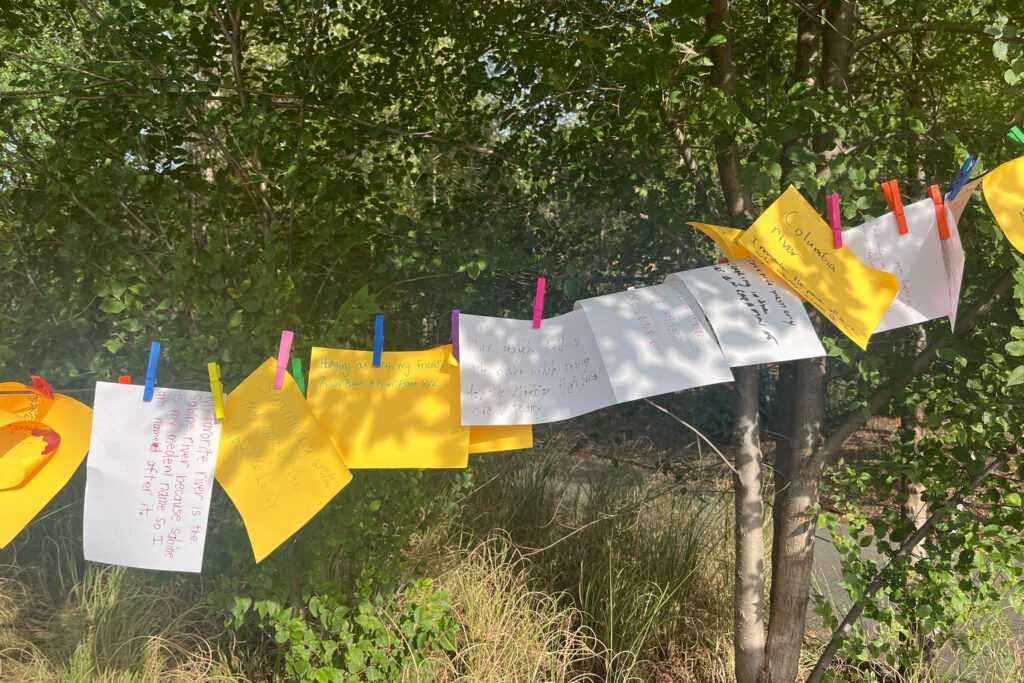It is a perfect day in Newark, New Jersey. The sky is a vibrant blue, with few clouds, over Riverfront Park. Willow trees drape down and drift with the wind. Music blares from portable speakers. People lie on the grass or bike and enjoy the occasional breeze on a warm summer day.
By a busy street that follows the river, a troupe of actors dressed in shades of blue stands near a makeshift stage. An audience of about 50 people gathers on a mound of manicured grass—some in folding chairs, others spread out on picnic blankets.
Cynthia Mellon clasps her hands against her chest in anticipation. Her play, “Flow(ish)”, is about to begin. And Newark’s Passaic River is about to become a star.
Once a lifeline for fishing and industry, the Passaic is one of the most contaminated waterways in the nation. Despite years of proposed cleanups, sluggish legal battles have allowed its environmental health risks to survive for years. No one can swim, fish or wade in its waters.
Mellon lives in Newark and she found the ebb and flow of lost opportunities here a drama worth exploring. The Passaic River has been a Superfund site for over four decades, and in her rendering, it is a victim and a witness to environmental tragedy.
Mellon is a community organizer with the needs-based nonprofit Ironbound Community Corporation and serves on the Passaic River Community Advisory Group that works with the city to hold polluters accountable. “Flow(ish)”, a title partially inspired by the fact that for a long time the Passaic didn’t really flow well and was laden with sediment, is Mellon’s effort to bring the fight into the arts.
The play, performed for one day in the park, originally was a submission to the Garden State New Plays Festival in Jersey City for a reading at its festival in May. Several activists were encouraged to apply. A few explored themes of gentrification and criminal justice. For Mellon, the river was a natural choice given all of her work.
“At the time, the river was calling me so much,” Mellon remembered. “I just said the main character of my play is going to be the Passaic River.”

Stretches of the Passaic River are full of chemicals, including dioxin—a highly toxic substance in Agent Orange, the chemical defoliant used by the U.S. military during the Vietnam War. “Flow-ish” was performed steps from the now-closed Diamond Alkali Company, which manufactured chemicals used in Agent Orange.
Mellon’s 30-minute play informs audience members about what industry did to the river’s health and what it does to their own. She follows the Indigenous tribes who lived off the river and, as the United States was formed, Alexander Hamilton’s efforts to use the river as a pivotal energy source for industry.
She lays out how the Passaic evolved into an industrial river that, as factories dumped chemical waste into its water and along its banks, raised cancer risks. And she portrays the pleas of the community to clean the Passaic and the suffering caused by its stew of contaminants.
“Playwriting is storytelling,” Mellon said. “If you want to learn about this, you can go to the website or read something. There’s plenty of reports. But I wanted to take the opportunity to tell the story in it.”
This story is funded by readers like you.
Our nonprofit newsroom provides award-winning climate coverage free of charge and advertising. We rely on donations from readers like you to keep going. Please donate now to support our work.
Donate Now“Flow(ish)” begins with a fisherman tossing a line into the river–only to be warned by a passerby that fish from the Passaic are poisonous. Some in the audience that day clearly knew the river’s polluted history and nodded and whispered among themselves at times. Street passersby paused to listen, finding this bit of theater more than entertainment. Before and during rehearsals, Mellon stopped teenagers or families or anyone walking by to hand out informational leaflets about the plight of the Passaic.
Mellon said she has been struck by how many residents were unaware of the river’s ills. “One of our friends invited a lot of people from her synagogue, and they came, and probably don’t know anything about this,” Mellon said. “I remember meeting someone, and she said, ‘I didn’t know there’s a river in Newark.’”
Mellon and the actors—mostly students from nearby Montclair State University—spent six weeks in rehearsal with director Jessica Braton, associate professor of theater at the school. One character in the play asks the audience bluntly: “Do you know what Agent Orange is?” Mellon based that character on a person who, for years, was pivotal in forming the community group that has demanded environmental reviews and reforms of the waterway.


Carol Johnston, better known to Mellon as Sister Carol, was a nun long active in social causes and education who pushed residents to advocate for a cleaner river through the legal system and government agencies. The first community advisory group meeting was held in a church, Mellon said, and Sister Carol was clear-eyed about the challenge.
“She did all the research and always found out what we needed to do,” Mellon said of Johnston, who died of cancer in 2013 at age 68. “She loved water.”
Mellon said the play serves as a tribute to the passionate people who have come before, such as Johnston, and “those who continue to show up” to advocate for their river. That includes staff from the federal Environmental Protection Agency, which has seen its authority weakened in the months of the second Trump presidency, she said
“I admire the persistence of the people who’ve kept on with this all these years,” Mellon said. “It’s this long, long journey. I’m so proud of the people who stuck with us.”
About This Story
Perhaps you noticed: This story, like all the news we publish, is free to read. That’s because Inside Climate News is a 501c3 nonprofit organization. We do not charge a subscription fee, lock our news behind a paywall, or clutter our website with ads. We make our news on climate and the environment freely available to you and anyone who wants it.
That’s not all. We also share our news for free with scores of other media organizations around the country. Many of them can’t afford to do environmental journalism of their own. We’ve built bureaus from coast to coast to report local stories, collaborate with local newsrooms and co-publish articles so that this vital work is shared as widely as possible.
Two of us launched ICN in 2007. Six years later we earned a Pulitzer Prize for National Reporting, and now we run the oldest and largest dedicated climate newsroom in the nation. We tell the story in all its complexity. We hold polluters accountable. We expose environmental injustice. We debunk misinformation. We scrutinize solutions and inspire action.
Donations from readers like you fund every aspect of what we do. If you don’t already, will you support our ongoing work, our reporting on the biggest crisis facing our planet, and help us reach even more readers in more places?
Please take a moment to make a tax-deductible donation. Every one of them makes a difference.
Thank you,











